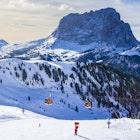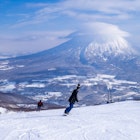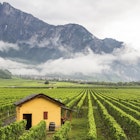

Expect jawdropping sights like the Landwasser Viaduct on your train trip around Switzerland © Julia Wimmerlin / Shutterstock
There’s a romance to train travel that no other form of transport offers. Pick the right route and instead of just being about getting from A to B, your journey becomes an intrinsic, enjoyable part of the greater holiday experience – sitting back, relishing the views, sipping a drink, letting someone else deal with the practicalities.
And nowhere does spectacular rail routes better than Switzerland, a small country with a big, efficient transport system to be envied and scenery to enchant. Here’s our selection of some of the best train trips you can do there and some of the highlights along the way, concentrated in the country’s south where the scenery is arguably at its most stunning.

The Bernina Express: a linguistic adventure
The Bernina Express, named after the 2328m-high mountain pass it traverses, is a classic train ride in Switzerland's southeastern linguistic melting pot. A scenic day trip can easily be made travelling the section from swanky, German-speaking St Moritz through Alpine peaks to the Italian-speaking town of Poschiavo. Stop for a stroll around the latter and enjoy some tasty pasta or pizza (you’re just 13km from the border with Italy so you know it’s going to be good) at the Hotel Albrici restaurant in the town’s set-piece central square. And just when you’ve figured out which language to speak in which area, you might hear locals speaking Romansch – Switzerland’s fourth but least known official language is spoken by around 20,000 people in this area (and within those, it’s split into different dialects just to add to the fun).
Back on the train you can just sit back, enjoy the scenery and listen to the onboard commentary detailing the route’s history and highlights. For something off the beaten track on your Bernina day out, choose a station at random and press the Stop On Request button to get off the train and do some DIY exploration – most stations have panels giving local information and hike suggestions.

The Glacier Express: excellence all the way
Since it opened in 1930 the Glacier Express has been the jewel in the crown of Switzerland’s train trips and one of the world’s great rail rides. Running from St Moritz (so you can add it on to a Bernina Express journey) to Zermatt, another of the country’s top winter sports centres, its unrivalled views of the Swiss Alps are matched only by the astonishing feats of engineering that made the route possible in the first place. The latter is best exemplified by the Landwasser viaduct, a gravity-defying six-arched bridge between Tiefencastel and Filisur, while nature’s showstoppers include the Oberalp Pass (2033m), where the train usually makes a stop to allow passengers to alight and take in the views, and the Mattertal, Switzerland’s deepest canyon.
Whatever class of carriage you’re in, this is a wonderful journey, but to really make it a once-in-a-lifetime experience, consider an upgrade to Excellence Class. You know you’re in for special treatment when you board via a red carpet and things just keep getting better from there – huge windows for views to the max, a seven-course meal and a tablet giving route details and background information are just a few reasons to pay the extra. For more on Excellence Class, see our coverage here.
Zermatt, Toblerone and the Gornergrat Railway
Pretty-as-a-picture Zermatt is Switzerland’s other (along with St Moritz) glitzy ski resort. Its advantage over its eastern counterpart is the looming, hypnotising contortion of a mountain, the Matterhorn, which dominates the skyline. The mountain is known to many from its starring role on the Toblerone box, and turning a corner in Zermatt and catching an unexpected glimpse of this magnificent peak never gets old.
But for an even more impressive view jump on the Gornergrat Railway and head up to the mountain of the same name. This narrow gauge train opened in 1898 and still climbs a daunting 20% gradient on some sections before depositing you a lofty 3089 metres above sea level. High as this is, the Gornergrat is actually a minor mountain round these parts, sitting perfectly in the centre of a 360-degree panorama that takes in 29 4000m-plus peaks (out of a national total of 49). Most notable are the striking Matterhorn, constantly drawing the eye, but higher, if less visually arresting, is the country’s highest mountain, Monte Rossa, topping out at 4634 metres. You can stay the night in the hotel at the top of the Gornergrat (and enjoy star-gazing under light-pollution-free skies), enjoy a meal on the terrace or ski back down, trying not to be too distracted by the distracting natural spectacle all around you.

The Schilthorn: licence to thrill
We make no apologies for the bad pun because the journey to and views from the Schilthorn mountain are truly amongst the country’s most thrilling. Plus the area is so beautiful that it caught the eye of the James Bond team who made On Her Majesty’s Secret Service here in 1968 – and if it’s good enough for 007, it’s good enough for us. The only Bond film to star George Lazenby as the secret agent, many of the movie's scenes were filmed in the Piz Gloria revolving restaurant, which is little changed today. Spies aside, it’s the views from the 2970m summit that draw visitors here, a magnificent parade of Alpine peaks including the infamous Eiger (though its notoriously difficult-to-climb north face is hidden from this angle).
To get up here from the valley below you need to take a series of cable cars which, with typical Swiss efficiency, connect seamlessly at the various stations en route. At one of these, Birg, it’s worth getting off to brave the cliff-clinging Thrill Walk, complete with glass floors and a rope bridge over a dauntingly high drop (don't worry, there's a net).

A lakeside loiter
Switzerland isn’t just about mountains. Tucked into the valleys between the soaring peaks are sparkling lakes, their turquoise waters reflecting the surrounding scenery. The most famous is Lake Geneva (aka Lac Leman), with the eponymous city at the western end and pretty towns and vineyards dotting its northern shore (the southern is mostly in France). The train travels close to the water for much of the lake’s length, but most passengers jump off at the eastern extreme to visit the country’s most popular attraction, Chillon Castle. Everything you’d want from a medieval chateau, this place is a maze of grand rooms and gloomy dungeons with highlights being the subterranean prison where Byron found inspiration (and left his name graffitied on a column) and the guards walk, a rickety wooden platform that leads to the keep. The castle’s wine is grown using local grapes and only available here and in a few select places in nearby Montreux, so grab a bottle on the way out if you’d like to try some. The castle has its own train station, or you can catch a bus or walk along the lake from Montreux.

Making it happen
Trains aren’t cheap in Switzerland, and buying individual tickets for routes can see costs climb as high as the Alps. Your best option therefore is to get a Swiss Travel Pass. There are a few different options, but the main one gives almost unlimited use of all forms of land and water transport in the country, plus entry to hundreds of museums, making it well worth the investment. Prices start from CHF418 for an eight-day, second-class pass. If you just want to show up and start riding those rails with someone else taking care of the logistics, many companies offer bespoke packages including Vacations by Rail (see below).
Clifton travelled to Switzerland with support from Vacations By Rail, Swiss Travel Systems and Switzerland Tourism. Lonely Planet contributors do not accept freebies in exchange for positive coverage.
https://shop.lonelyplanet.com/products/switzerland-travel-guide-9
Explore related stories










